Key takeaways:
- Understanding employment contracts is essential as they set clear expectations and guide professional relationships, impacting both trust and career trajectories.
- Key elements like scope of work, compensation, and termination clauses must be clearly defined to prevent misunderstandings and ensure job security.
- Common types of contracts—permanent, fixed-term, and temporary—each offer different levels of stability and flexibility, influencing career decisions.
- Taking the time to review contracts and consulting professionals when necessary can prevent future frustrations and empower individuals in their negotiations.
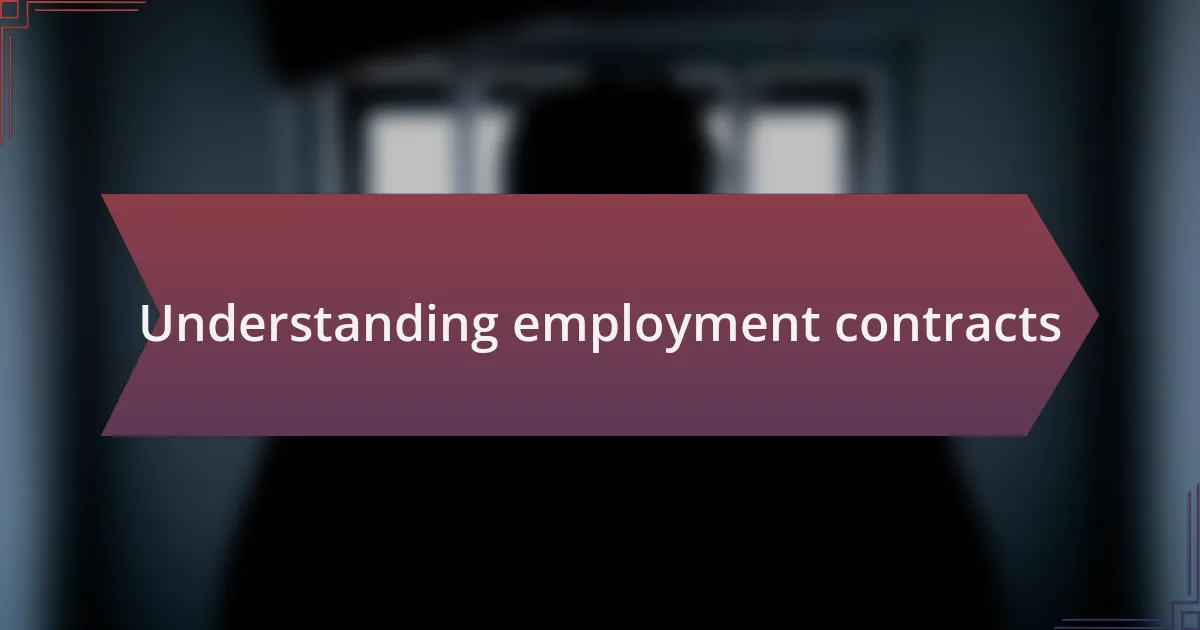
Understanding employment contracts
Employment contracts are often seen as mere formalities, but I believe they are crucial for establishing a clear understanding between employer and employee. When I first started my career, I remember how overwhelming it felt to sift through legal jargon. It made me realize just how important it is to grasp the fundamental terms, such as the scope of work, compensation, and termination clauses. Have you ever signed a document without fully understanding its implications? It’s a common pitfall that can lead to misunderstandings later on.
Delving deeper, I’ve found that every employment contract tells a story about the working relationship. It’s like a roadmap, guiding both parties on what to expect. For instance, I once encountered a colleague who assumed their job was secure without reading the termination clause. Their surprise when layoff notices circulated was a wake-up call. This experience taught me to view contracts not just as legal safeguards but as essential tools for navigating my professional journey.
Moreover, the emotional weight of an employment contract can’t be overlooked. It signifies trust and commitment—an agreement that impacts not just finances, but also one’s daily life and aspirations. Whenever I sign a contract, I reflect on how it shapes my future. Does your contract reflect your values and ambitions? Taking the time to understand and negotiate the terms can make a world of difference, ensuring that you are not only protected but also empowered in your career.
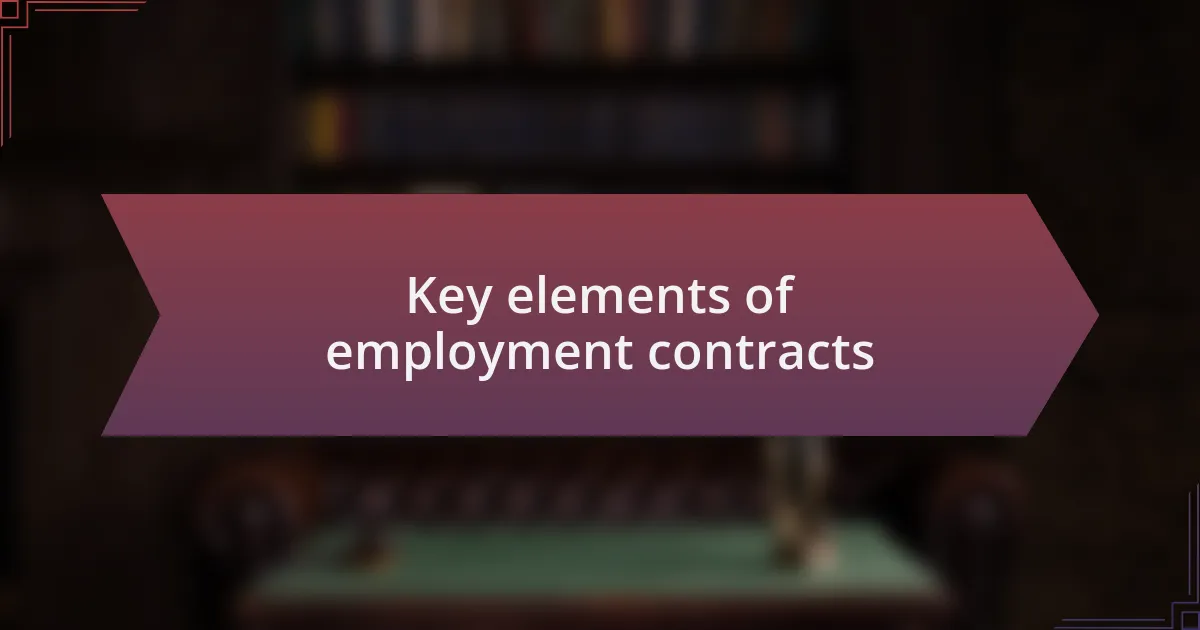
Key elements of employment contracts
Key elements of employment contracts are foundational to ensuring a smooth working relationship. One critical component is the scope of work. I recall when I joined a startup where my role was vaguely defined. It led to confusion about responsibilities and expectations, ultimately straining my relationship with my manager. Clarity in these terms is essential—without it, you might find yourself juggling tasks that were never part of your job description.
Another vital element is compensation and benefits. I vividly remember negotiating my first salary. It felt daunting, yet I quickly realized that understanding not just the salary but also bonuses, health benefits, and retirement plans profoundly impacts financial security. If you’re unsure about what’s typical for your role or industry, asking questions can be empowering. How can you make informed decisions without the right information?
Finally, termination clauses often go overlooked but can have significant repercussions. A close friend once faced an unexpected job loss due to a vague termination clause in their contract. This experience highlighted the importance of knowing under what circumstances your employment can end. It’s a sobering reminder: What safeguards do you have in place? Taking time to dissect these clauses can dramatically affect your job security and peace of mind.
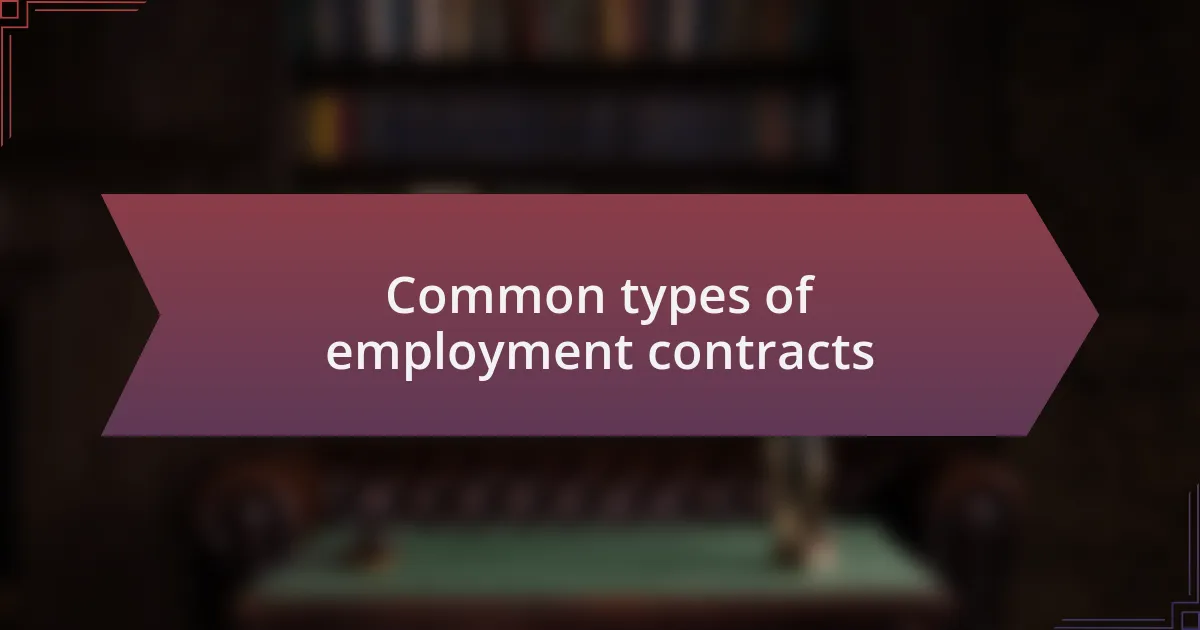
Common types of employment contracts
When it comes to employment contracts, there are several common types that you might encounter. For instance, a permanent contract offers job security and benefits but also implies a long-term commitment. I remember feeling a sense of relief when I secured a permanent position; it felt like a chapter in my career had finally begun. That stability can significantly enhance your performance, knowing you have a reliable foundation.
On the other hand, fixed-term contracts can be a double-edged sword. While they provide opportunities for specific projects, they often come with uncertainty about future employment. In my early career, I took on a fixed-term role, and while it was exciting to work on a significant project, I often found myself anxious as the end approached. Have you ever wondered how you’ll navigate your next steps when your contract concludes?
Finally, temporary contracts and freelance agreements each cater to different needs and flexibility levels. With a temporary contract, you might find yourself jumping into roles that keep the workforce agile. I once worked as a temp during a busy season, enjoying the variety of tasks but also feeling the pressure of not being “part of the team.” It made me reflect—in a world that’s constantly changing, what do you value more, stability or variety? Understanding the nuances of these contracts can help you decide what aligns best with your career goals.
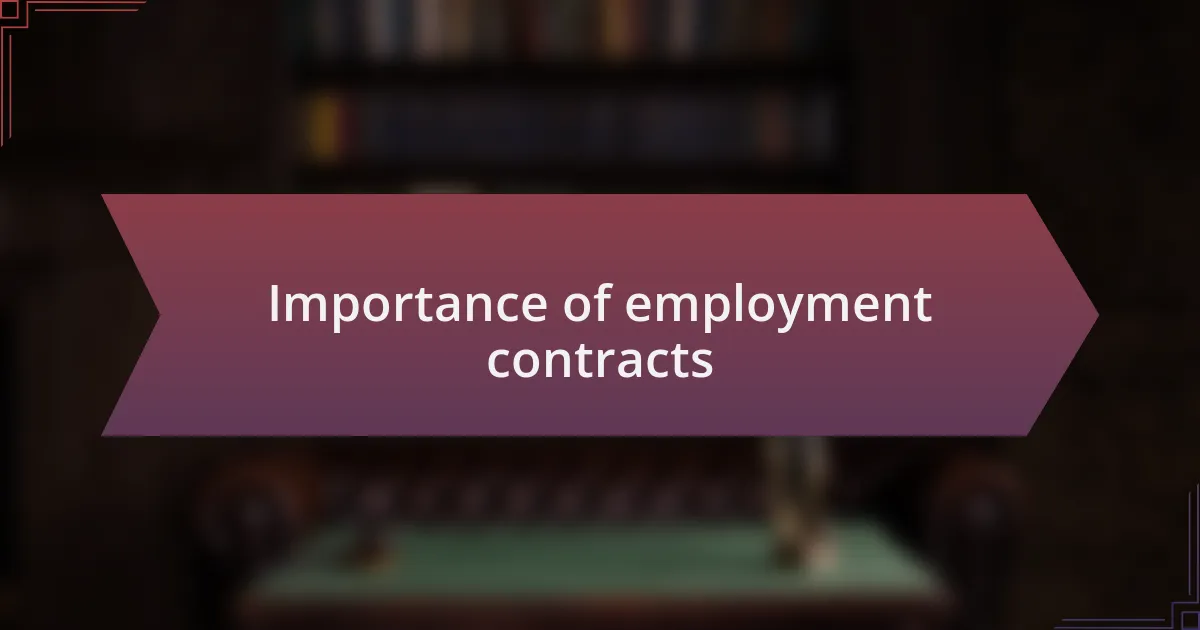
Importance of employment contracts
Employment contracts are essential in establishing clear expectations for both parties involved, laying the groundwork for a successful working relationship. I once entered a role without a solid contract, and it quickly became a source of confusion and frustration. Have you ever felt uncertain about your responsibilities? It’s a reminder that clarity can prevent misunderstandings and foster a more harmonious workplace.
Moreover, employment contracts not only outline job duties but also address compensation and benefits, which are critical for employee satisfaction. I recall a time when I negotiated my salary, and having a documented contract helped me articulate my worth confidently. It’s empowering to know that your contributions are recognized in writing, wouldn’t you agree? This reinforces not just financial stability but also boosts morale.
Additionally, the legality of employment contracts protects both the employer and employee, creating a framework for resolving disputes. In my experience, having that legal backing was invaluable during a disagreement over duties. It’s crucial to feel secure knowing there’s a protocol in place to handle such situations. If you’ve ever faced a conflict at work, you understand how vital it is to have something to refer back to.
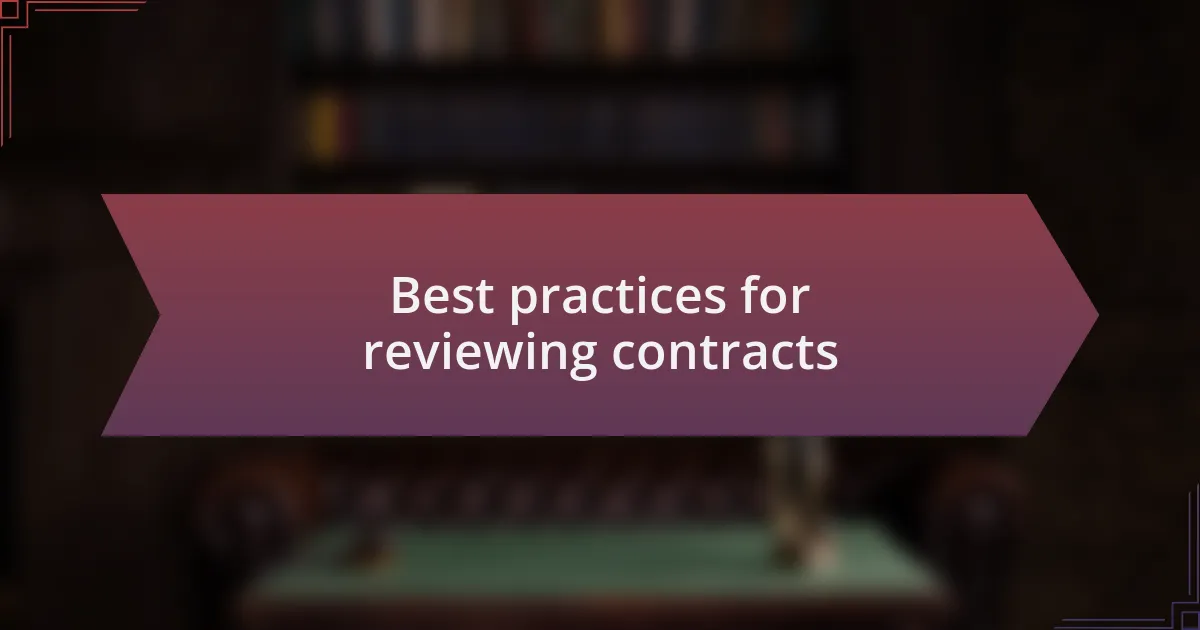
Best practices for reviewing contracts
When reviewing contracts, I recommend taking your time. A rushed review can lead to overlooking crucial details, which I’ve come to appreciate after skimming a contract only to find hidden clauses that affected my role significantly. Have you ever regretted jumping into something without giving it a thorough look?
Focusing on key terms is essential. Look for specifics regarding job responsibilities, compensation, and termination clauses. I remember dissecting a contract line by line; it felt tedious but uncovering a vague termination clause saved me from a potentially sticky situation later. What could have been a source of anxiety turned into clarity.
Additionally, don’t hesitate to consult a professional. I once worked with an attorney to review a contract, and their insights transformed my understanding of the terms. It can feel daunting, but you deserve to feel confident in what you are agreeing to. Isn’t it worth the investment in your peace of mind?
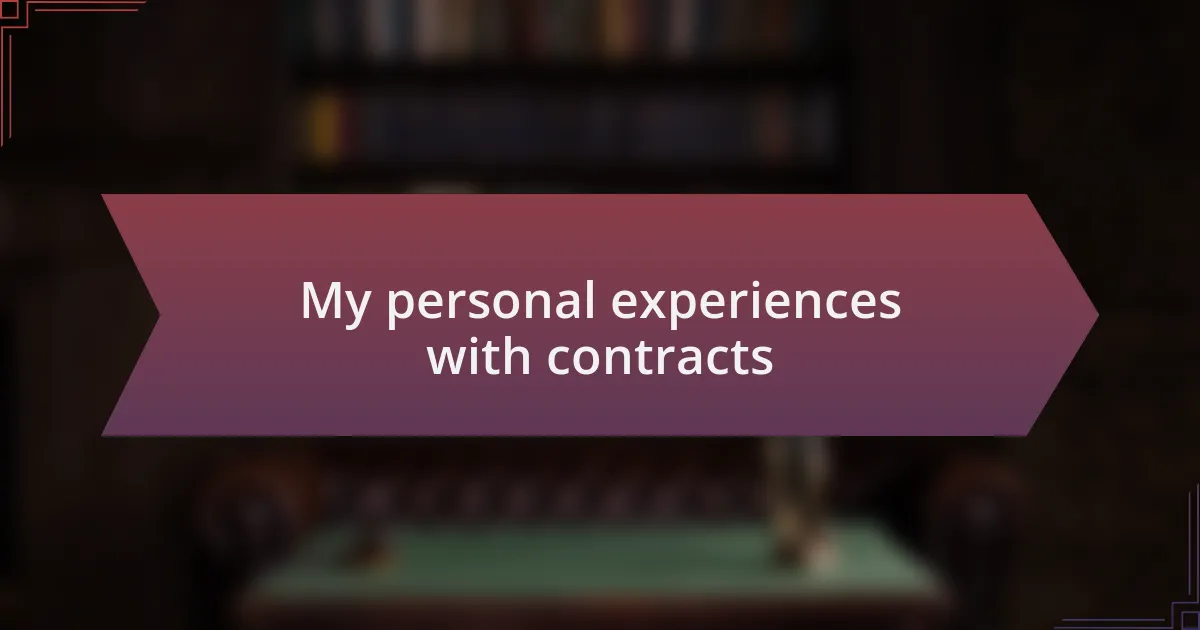
My personal experiences with contracts
My own experiences with contracts have taught me invaluable lessons about the importance of clarity. Early in my career, I signed a contract that seemed straightforward, but later realized the language was vague regarding promotions and raises. That realization led to months of frustration; I often wondered, what was I missing? Now, I double-check every provision to ensure I fully understand what I’m committing to.
There was a time I pushed aside my gut feeling about a particularly lengthy contract. I was eager to start a new opportunity, but I regretted not addressing the ambiguous clauses. The unease lingered as I worried over whether the role would match what was promised. It’s funny how those moments of doubt can signal a need for deeper investigation.
Most notably, a contract negotiation I had years ago opened my eyes to advocating for myself. I felt nervous asking for changes, but when I finally voiced my concerns, I discovered that the employer was open to discussion. That experience taught me how empowering it is to speak up—after all, a contract is a reflection of a mutual agreement, not just a form to sign. Have you had similar moments that shaped your outlook on contracts?
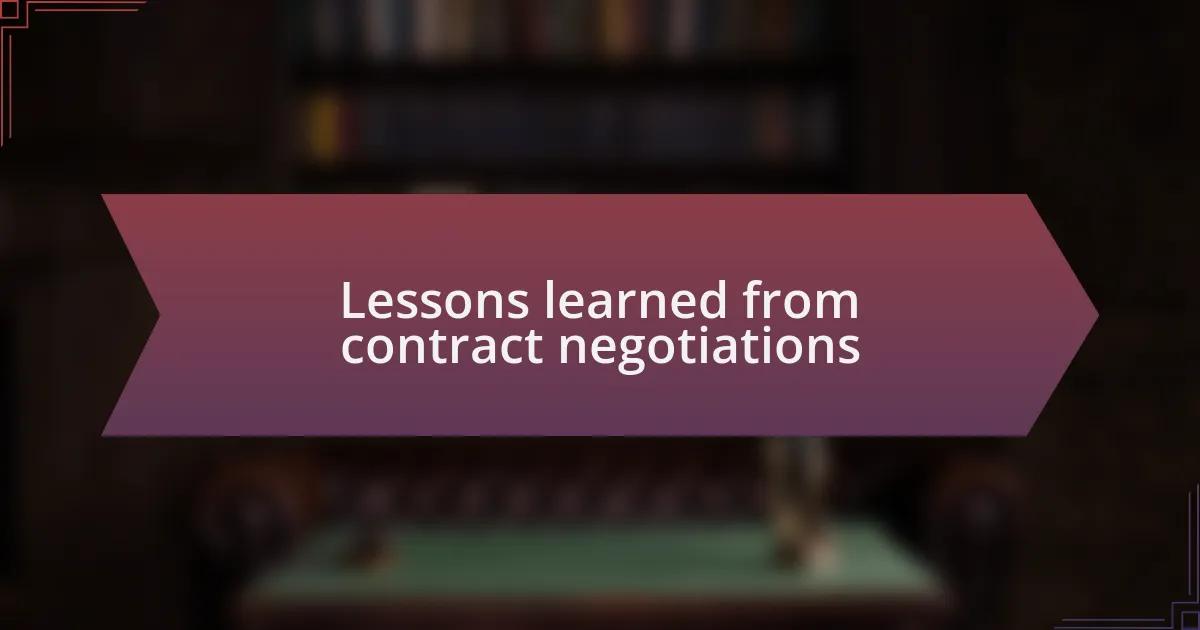
Lessons learned from contract negotiations
During my first serious negotiation for a job offer, I learned the importance of asking the right questions. The provided salary seemed enticing until I inquired about benefits and bonuses, which revealed a significant gap in total compensation. I remember feeling a rush of anxiety when the employer explained the discrepancies, but that moment reinforced a crucial lesson: never assume that the upfront terms alone define your worth.
Another experience involved a confusing non-compete clause that I overlooked. I signed that contract feeling excited, only to face challenges later when I wanted to explore other opportunities in my field. That lesson was painful; I realized the emotional toll of feeling trapped by a misunderstanding. Have you ever found yourself stuck because you overlooked something seemingly minor?
Lastly, I’ve become a strong advocate for taking notes during negotiations. I remember a negotiation where I documented everything discussed, and it turned out to be invaluable. When discrepancies arose later, I could refer back to those notes to clarify intentions and protect my interests. Those records not only offered peace of mind but also illustrated the power of staying engaged in the process and being proactive about my future.